Heating Up the Campaign Trail
Air Date: Week of June 1, 2007
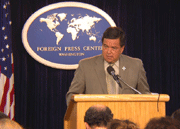
(Courtesy of U.S. House of Representatives)
Global warming has emerged as one of the top issues for candidates in the race for the White House. Living on Earth's Jeff Young explores this changing political climate.
Transcript
GELLERMAN: From the Jennifer and Ted Stanley Studios in Somerville, Massachusetts - this is Living on Earth. I’m Bruce Gellerman, sitting in for Steve Curwood.
It puzzles political pollsters. Sixty three percent of Americans say that the country is in as much danger from environmental threats as terrorism. But, typically, come Election Day, voters give environmental issues short shrift. Or, at least, that’s the way it’s been till now. Election 2008 is shaping up differently. With global warming and energy issues on people’s minds, presidential hopefuls are feeling the heat. As Living on Earth’s Jeff Young reports candidates on the campaign trail are making climate change a primary issue.
YOUNG: Al Gore keeps telling us, “no,” he is not running for president.
GORE: I’m really not I’ve fallen out of love with politics (laughing)
YOUNG: But Gore and other climate change activists can already claim a sort of victory in the ‘08 race for the White House. In January Gore told Living on Earth he hoped to see the political climate change when it came to global warming.
GORE: I want to see the creation of a new political reality in America where the candidates in both political parties are competing among themselves to offer genuinely effective solutions.
YOUNG: Just five months later most of the frontrunners in the presidential race are doing just that.
MCCAIN: The facts are facts and climate change is real, and it’s threatening and it’s inevitable that we act
CLINTON: This is a problem whose time has come.
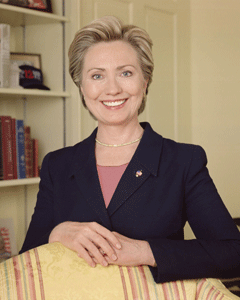
Senator Hillary Clinton, D-NY (Courtesy of U.S. House of Representatives)
YOUNG: And it’s not just soundbites from Senators Barak Obama, Hillary Clinton, and John McCain. All three have detailed plans to cut emissions of the heat trapping gas carbon dioxide. McCain sponsored the first bill in Congress to call for a cap and trade system to control CO2. Clinton and Obama support his bill and call for even stiffer reductions. Former Senator John Edwards proposes ambitious CO2 cuts, and in a symbolic move, Edwards was the first major candidate to make his campaign carbon neutral.
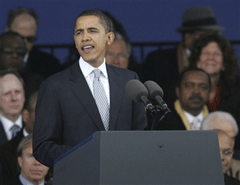
Senator Barak Obama, D-Ill (Courtesy of U.S. House of Representatives)
YOUNG: Navin Nayak with the League of Conservation Voters says most major candidates now have specific and substantial campaign platforms on climate change.
NAYAK: We’re really encouraged that eight months from the first vote more candidates have put out comprehensive plans on energy and global warming than on any other domestic issue, more than health care, more than education and we just think that’s gonna continue to grow as we get closer to this election.
YOUNG: Nayak says candidates are catching up with public opinion, which shifted sharply in favor of action on climate over the past two years. In exit polling from fall’s congressional elections roughly half the respondents said global warming played some role in deciding their vote.
And that lesson is not lost on those Democratic Presidential candidates who are lagging in polls and fundraising. Several have put out bold climate policy as a way to stand out in a crowded field of contenders. Here’s New Mexico Governor Bill Richardson.
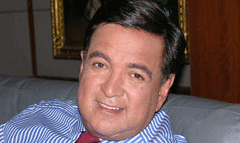
Governor of New Mexico, Bill Richardson (Courtesy of the State of New Mexico.)
YOUNG: Richardson’s aggressive timetable for slashing CO2 and raising auto fuel efficiency won praise from conservation groups.
Connecticut Senator Chris Dodd pushed things a bit further by being the first candidate to propose a tax on high-carbon fossil fuels.
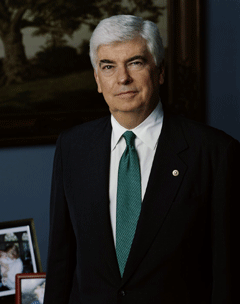
Senator Chris Dodd, D-CT (Courtesy of U.S. House of Representatives)
By swinging for the fence with ambitious programs these so-called second tier candidates are expanding the range of climate solutions in the debate. Among Republicans McCain is so far the only candidate making climate a priority, and he’s doing it in a way he hopes will resonate with Republican primary voters. McCain’s recent speeches cast climate in national security terms.
MCCAIN: A group of senior retired military officers recently warned about the potential upheaval caused by conflicts over water, arable land and other natural resources under strain from a warming planet. It is a serious and urgent economic, environmental and national security challenge.
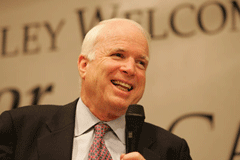
Senator John McCain, R-AZ (Courtesy of U.S. House of Representatives)
SOUTH: Republican candidates who come into this state and do not take global warming seriously are gonna be in trouble.
YOUNG: That’s Garry South, a veteran political consultant in California. South says California Republicans are environmentally sensitive voters, and Governor Arnold Schwarzenegger’s political comeback proves it. Schwarzenegger recovered from a low point in his first term in part by embracing bold action on climate change. And South says any Republican who hopes to enjoy Schwarzenegger’s success must at the very least acknowledge the threat of global warming.
SOUTH: If you can’t pass that threshold you’re gonna be viewed in California as if you’re from the planet Pluto. And of course you know the planet Pluto was just demoted. The second thing is you have to say something about dealing with the crisis of climate change.
YOUNG: South expects more candidates to tackle climate change as the campaign heats up.
For Living on Earth I’m Jeff Young in Washington.
Links
Living on Earth wants to hear from you!
Living on Earth
62 Calef Highway, Suite 212
Lee, NH 03861
Telephone: 617-287-4121
E-mail: comments@loe.org
Newsletter [Click here]
Donate to Living on Earth!
Living on Earth is an independent media program and relies entirely on contributions from listeners and institutions supporting public service. Please donate now to preserve an independent environmental voice.
NewsletterLiving on Earth offers a weekly delivery of the show's rundown to your mailbox. Sign up for our newsletter today!
 Sailors For The Sea: Be the change you want to sea.
Sailors For The Sea: Be the change you want to sea.
 The Grantham Foundation for the Protection of the Environment: Committed to protecting and improving the health of the global environment.
The Grantham Foundation for the Protection of the Environment: Committed to protecting and improving the health of the global environment.
 Contribute to Living on Earth and receive, as our gift to you, an archival print of one of Mark Seth Lender's extraordinary wildlife photographs. Follow the link to see Mark's current collection of photographs.
Contribute to Living on Earth and receive, as our gift to you, an archival print of one of Mark Seth Lender's extraordinary wildlife photographs. Follow the link to see Mark's current collection of photographs.
 Buy a signed copy of Mark Seth Lender's book Smeagull the Seagull & support Living on Earth
Buy a signed copy of Mark Seth Lender's book Smeagull the Seagull & support Living on Earth

